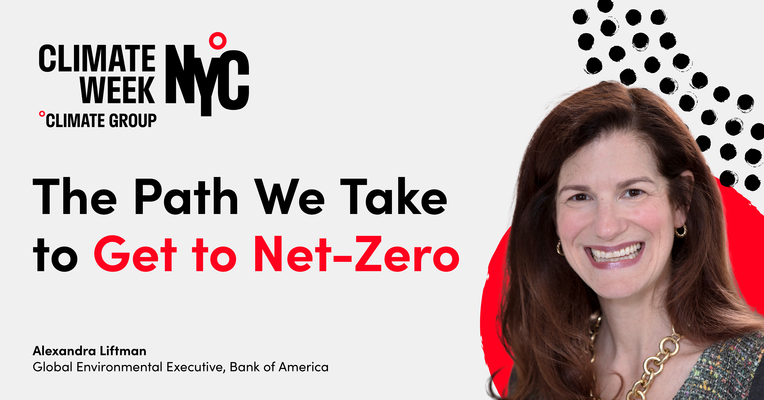Q&A with Alex Liftman, Global Environmental Executive, Bank of America
Earlier this year, Bank of America committed to achieving net zero greenhouse gas (GHG) emissions in its financing activities, operations and supply chain before 2050. How are you planning to reach your goal?
The Sixth Assessment Report from the IPCC is sounding the alarm for how little time we have to avert climate catastrophe. The path forward is clear: we must rapidly transition to a net-zero economy. Doing so will take ambition and strong collaboration across the public and private sectors, and financial institutions have a significant role to play.
Bank of America set our net zero goal in line with a longstanding support for the need to take bold action on climate change. While we have always worked with our clients and vendors on climate issues, we now have a formal goal to achieve net-zero GHGs for our supply chain and financing activities, along with our operations. To ensure we make meaningful near-term progress, we have set and will continue to set clear science-based 2030targets for all of these areas.
A critical part of reaching this goal is strong engagement and partnership with our clients. Part of our goal is to work with our clients to help to advise them and to help to provide the capital and expertise that they need to make the investments to decarbonize. Our expectation is that our clients will bring a commitment to decarbonize themselves because we can't decarbonize in our financing activity unless our clients decarbonize.
There is increased attention to standardization and comparability in regard to ESG disclosures. How can we ensure that investors and other stakeholders have the information they need to make informed decisions about who they are doing business with?
One of the most important ways to address climate change is to better understand the risks companies face. At Bank of America, we have been committed to ESG reporting for many years and outline our approach to risk management through our Environmental and Social Risk Policy Framework. We also support the recommendations of the Taskforce on Climate-related Financial Disclosures (TCFD), disclose in line with TCFD, and ask our clients to do similarly. And last year we joined the Partnership for Carbon Accounting Financials, working with other financial institutions to provide a consistent methodology with which to assess and disclose emissions associated with financing activities.
There is also the challenge of getting consistent, comparable data across a range of ESG metrics, not just climate-risk. Investors and other stakeholders need that information to make informed decisions about companies they do business with. To provide a vehicle for disclosure, our CEO Brian Moynihan recently used his position as chairman of the World Economic Forum’s International Business Council to engage the big four accounting firms and other stakeholders. The result was the Stakeholder Capitalism Metrics framework. The metrics pull from and expand on best practices in existing measurement frameworks, giving stakeholders clear and consistent data with which to evaluate companies on their overall ESG efforts, including their paths to net-zero.
Bank of America has recently made a $1.5 trillion sustainable finance commitment. How can sustainable finance ensure that the “E” and “S” pieces work together to advance common goals?
We know climate change and other environmental impacts are disproportionately felt by marginalized communities and we know there is a critical need to ensure that those communities are not left out of the opportunities stemming from the transition to a net-zero economy. Issues of environmental and social justice cannot be separated; they must be addressed in tandem as we think through the broader transition to a more sustainable society.
We bring this lens of environmental justice to our sustainable finance commitments. For example, in partnership with Enterprise Community Partners, we are investing $60 million to help facilitate racial equality in housing, which includes developing green, affordable housing for Black, Indigenous and People of Color (BIPOC.) Additionally, in April, we issued a $2 billion Equality Progress Sustainability Bond designed to advance racial equality, economic opportunity and environmental sustainability. The transaction also represents the first sustainability bond issued by a U.S. bank holding company where the social portion of the use of proceeds will be dedicated to financial empowerment of Black and Hispanic-Latino communities.
